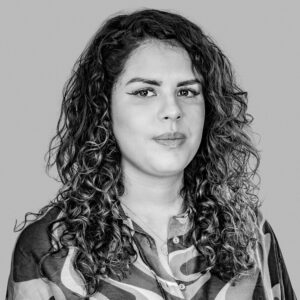
Amel
ROOTS: Algerije
Ik ben voornamelijk Nederlands opgevoed.
Via mijn Algerijnse familie kregen we ook die cultuur mee als kind.
Daar aten we Algerijnse gerechten en werd er Algerijns gesproken.
Mijn vader praat niet vaak over zijn thuisland.
Omdat, als je door politieke redenen vertrekt, er bepaalde gevoeligheden liggen.
Dat begrijp ik wel.
Vroeger wilde ik altijd lang blond haar en blauwe ogen.
Ik wilde niks van mijn Algerijnse roots weten.
Nu word ik steeds nieuwsgieriger en stel ik vaker vragen.
Ik zit in een fase van mijn leven waarin ik me afvraag wie ik ben en wat ik wil in het leven.
Die vraagstukken zijn op zich al complex genoeg.
En daar komen dan ook nog die dubbele roots bij kijken.
Als ik bij mijn Algerijnse familie ben, worden sommige vragen vanzelf beantwoord.
Toch blijft communiceren lastig, omdat ik de taal niet vlekkeloos spreken kan.
Mijn ouders weten hoe lastig het kan zijn, als je je als buitenlander in Nederland settelen wil.
Ze zeggen altijd dat ik ‘gewoon’ Nederlander ben. En dat ook zo moet verkondigen.
Omdat ik anders minder kans zou maken, wanneer ik bijvoorbeeld een baan zoek.
Maar ik probeer ze ook duidelijk te maken dat ik mijn etniciteit niet weg kan stoppen.
Dat wil ik ook helemaal niet.
Kind zijn uit een gemixt huwelijk wordt de norm voor de toekomst.
Twee culturen die elkaar de hand schudden.
“Being a child from a ‘mixed marriage’ will be the norm in the future”
ROOTS: Algeria
I was raised primarily Dutch.
Via the Algerian side of my family, we all got to know that culture too, as kids.
We got to eat Algerian dishes and they spoke Algerian too.
My father doesn’t often speak of his homeland.
When you leave there for political reasons, you’re under a bit of a cloud.
It’s sensitive.
I do get that.
I always used to want long blonde hair and blue eyes.
I didn’t really acknowledge my Algerian roots.
Nowadays, I’m more curious about them and ask more questions.
I’ve reached a time in my life where I’m really asking who I am and what I want out of life.
These questions are really pretty complex.
Then too, you have to add those double roots into the mix.
When I’m with my Algerian family, the answers to some questions are pretty clear.
Communication is somewhat bothersome though because I’m not fully fluent in the language.
My parents know all about how hard it can be for foreigners to settle in the Netherlands.
They always say that I’m a ‘normal’ Dutch person, and that I should announce myself as such.
This, because I could be up against it if, say, looking for a job.
I try to make it clear to them that I can’t hide my ethnicity.
I really do not want to do that.
Being a child from a ‘mixed marriage’ will be the norm in the future.
Two cultures, shaking hands.

